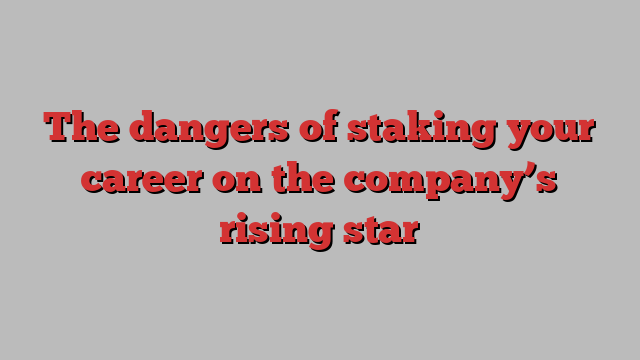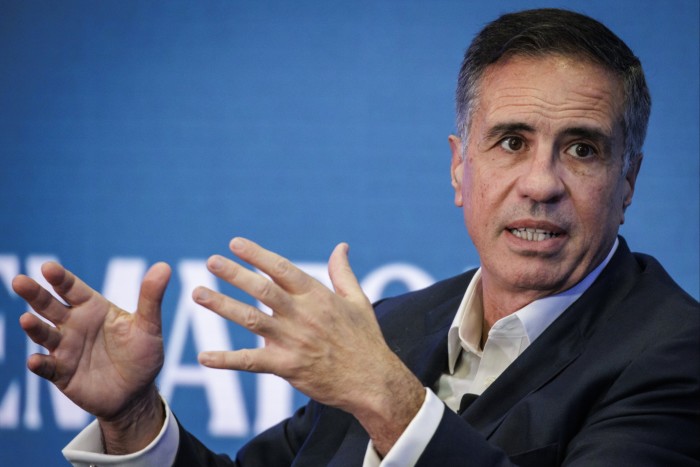
Stay informed with free updates
Simply sign up to the Work & Careers myFT Digest — delivered directly to your inbox.
The writer is an FT contributing editor and the author of ‘Inside the Leaders’ Club: How top companies deal with pressing business issues’
A recent Financial Times report on the race to succeed Jamie Dimon as chief executive of JPMorgan Chase contained a striking detail about the relationship between the bank’s president, Daniel Pinto, and Viswas Raghavan, a close Pinto ally: “The two men had neighbouring parking spaces at JPMorgan’s Canary Wharf office where they would both leave their Aston Martins.”
Leave aside the silliness of driving to an office well served by public transport, or of edging a car that sells for several times the average UK annual wage through London traffic. Consider instead how wise it is to tie yourself tightly to one senior executive.
Pinto certainly looked worth getting close to. He helped lead the US bank in 2020 when Dimon underwent emergency heart surgery and as recently as last month, the JPMorgan boss told CNBC that Pinto was still his “hit-by-the-bus successor”. But Dimon, who has been chief executive since 2006, has proved remarkably durable, and others, including Jennifer Piepszak, Marianne Lake and Troy Rohrbaugh, are now seen to be the favourites for the top job, when it eventually comes up.

A JPMorgan reorganisation this year did not go well for Pinto’s top lieutenants — Raghavan, Marc Badrichani and Takis Georgakopoulos — and they have all now left. The problem with hitching your wagon to a star is that the star may fade.
Niven Postma, an executive with experience in banking and the voluntary sector in South Africa and elsewhere, also learnt this bitter lesson. She once fixed her fortunes to a charismatic leader in an organisation she prefers not to name. “I ended up having one of the most productive, most impressive times of my career, because I had all of the air cover, all of the support of this absolutely exceptional leader,” she told me. “It was wonderful, and then it wasn’t, because he got shifted. I got exposed, and all of the support I should have been able to count on was non-existent.”
One way of avoiding this is refusing to play the office politics game. That may work, but there is a reason Postma called her book If You Don’t Do Politics, Politics Will Do You. Office politics happens whether we take part or not — and we don’t necessarily get the rewards we hope for just by doing a good job and hoping it is noticed.
Working your way up an organisation means impressing those above you. You do not often get to choose the boss you work for and, once you are part of a team, you become identified with it. An obvious answer is not to become too tied to one team or one boss, avoiding, in Postma’s words, becoming “one person’s person”.
To achieve that you could move around the company, acquiring experience in different areas and multiple senior allies along the way. That isn’t always easy; you may be in a geographical outpost, for example. And it becomes harder as you climb the hierarchy. You become skilled in what you do and there are fewer opportunities to move.
It can help to observe the politics of the organisation as a whole: not just the people who seem to be influential, but what the broader strategic priorities are and how they are changing.
You should not just make allies of those above you. Not everyone with a title has influence; some without the top job descriptions have more. Postma points to the power of personal assistants. “They’re gatekeepers. As somebody said to me a while ago, they’re the necks that turn the heads.” More than this: they know what is happening. They see the internal emails. A whispered word from them can warn you of trouble ahead.
Another simple tip is that most people don’t forget a useful conversation — or a kindness. Be helpful to people whoever they are. Give time to new recruits. Stop and introduce yourself. You never know when a colleague might be in a position to return the favour.
If this sounds overly instrumental, it is because I too didn’t understand until far too late in my career that you can’t just opt out of office manoeuvres. But, in any case, winning people’s trust and support is worth doing in itself, because it makes working life more rewarding.
And if the most senior jobs do not come to you — after all, there is a limit to the number of people who can get to the top — you will be warmly thought of and valued. That is worth more than an Aston Martin.